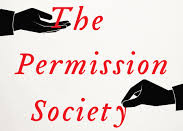Not having to ask permission is an essential part of freedom. The right to decide and to act without first asking leave of kings or bureaucrats, is the crucial difference between those who are free and those who are not. Today, however, Americans are gradually losing this principle of freedom and finding themselves in a Permission Society—a society in which our choices are subject to government pre-approval. Whether it be building a house, opening a business, getting a job, owning a gun, building a home, expressing one’s opinions, or even taking a life-saving medicine, federal, state, and local laws now impose permit requirements that forbid us to act unless we first get the government’s permission.
A permit to construct a home is now the largest single cost of building a house, and bureaucrats often demand payoffs in exchange for permits—a process the Supreme Court has called “extortion,” but which goes on nonetheless. When Florida businessman Coy Koontz tried to develop his land, local bureaucrats demanded that he set aside 11 acres as a nature preserve in exchange for being allowed to develop the remaining 3.7 acres. He agreed, but that wasn’t enough. They also insisted that he pay $200,000 to repair property on the government’s own property, located more than four miles away. When his lawyer protested, the officials were unmoved. “That’s the facts of life,” said one. Koontz sued, and the case bounced around the courts for more than two decades—so long that Koontz died before the Supreme Court at last ruled in his favor.
Officials are no less bossy when it comes to free speech. In 2013, Kentucky bureaucrats threatened to prosecute a newspaper columnist named John Rosemond for practicing psychology without a license. Rosemond, who had written the column for 40 years, was licensed in his home state of North Carolina, but because his column appeared in Kentucky newspapers, he was threatened with criminal prosecution. It’s hard to imagine that the authors of the First Amendment thought government could impose licensing requirements on the publication of advice columns—in fact, America’s first advice columnist was Ben Franklin, who served in the Constitutional Convention (and didn’t have a psychology license). Fortunately, in September, 2015, a federal judge ordered the bureaucrats to stop harassing Rosemond. But psychologists in all 50 states still have to get government approval before they practice their profession—even though their profession consists solely of speaking and advising, essentially indistinguishable from the counseling offered by pastors and close friends.
Myriad aspects of our lives now require some form of government permission. In many places, it’s illegal to possess a gun for self-defense unless the government thinks there’s “good cause.” Even taking medicine to save one’s own life requires permission.
Whether it be the right to take medicine, to use property, to own a firearm or to publish one’s opinions, our rights are increasingly being curtailed by bureaucrats who prefer to forbid us from acting, and then make us ask permission, than to let us make our own choices. Yet the basic presumption of the Permission Society—that people cannot be trusted with freedom—is not only wrong, but silly. Of course people can be trusted with freedom. We do it all the time. And if we don’t, then we must ask: whom can we trust with ours?





